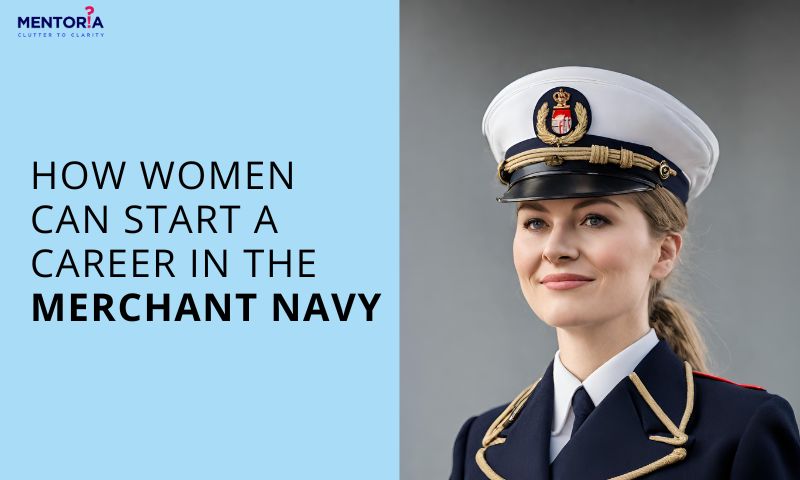How Women Can Start A Career In The Merchant Navy

Jump to Section
Times are changing, and so are the roles that women play in traditionally male-dominated fields. While we’ve seen women excel in areas like law and firefighting, one area that often goes unnoticed is the Merchant Navy.
Working at sea is not just a job; it’s a challenging and demanding profession. However, in the past, many women were discouraged from pursuing careers in the maritime industry due to concerns about work-life balance, societal pressures, and traditional roles.
Fortunately, in 1988, the International Maritime Organisation (IMO) launched its gender programme, opening up opportunities for women to join the maritime workforce. This article explores the journey of women in the Merchant Navy and the opportunities that lie ahead. Let’s dive in
What Is The Merchant Navy?
The Merchant Navy is a group of ships that transport goods and people between countries. These ships are like big floating trucks that carry things like food, clothes, cars, and even people on vacations. The people who work on these ships have different jobs, like driving the ship, fixing things, and making sure everything is safe. They spend a lot of time away from home, sometimes for weeks or months, because the ships travel long distances across oceans. However, they also get to see different places and have exciting adventures while working on the ships.
Can Women Join The Merchant Navy?
Throughout history, the Merchant Navy was seen as a field exclusively for men. Breaking into a male-dominated industry as a woman requires serious consideration. However, with women now present in all professions, the Merchant Navy has also recognised their importance. Over the past thirty years, many women have entered the Merchant Navy.
Today, there are numerous opportunities for women in this sector. Women can find openings not only at sea but also on land.
There is no reason why a woman cannot join the Merchant Navy as long as she meets the requirements. Captain Radhika Menon, the first female Merchant Navy Captain, is leading ships successfully and has received prestigious awards for her bravery, including rescuing fishermen in harsh weather conditions. So It’s now evident that women have the opportunity to join the merchant Navy and create a promising future for themselves. Let’s now explore how women can pursue a career in the Merchant Navy.
How Women Can Join The Merchant Navy?
The solution to this query is simple – like how males do it. If you meet the eligibility criteria and have the required education qualification, you can secure a place in the merchant navy academy and join the merchant navy. Here’s how:Both men and women need to perform well to enhance their likelihood of acceptance.
Step 1: Stream Selection
Most institutions require a science background with subjects like physics, chemistry, and maths. However, you can start your career in the Merchant Navy right after completing 10th grade.
Here are the additional qualifications needed:
- Indian Citizenship: You must be an Indian citizen to apply.
- Gender and Marital Status: Both male and female candidates who are unmarried can apply.
- Vision Requirements: Whether you wear glasses or not, you should have good night vision.
- Physical and Medical Fitness: You must be physically and medically fit in all aspects.
Step 2: Educational Qualification
To become a Merchant Navy officer after the 10th grade, you can follow these steps:
- Educational Qualifications: Most institutes require a 10+2 qualification in the science stream with the Mathematics group. However, some institutes do admit students who have completed the 10th grade.
- Diploma in Marine Engineering: This is a three-year certificate programme. After completing the Diploma, you can enrol in a two-year pre-sea training course. This course is necessary for Diploma holders to become eligible for Merchant Navy officer positions.
Courses Available after 10th:
- GP Rating Course: The General Purpose Rating course is a six-month programme that trains individuals for deck and engine room tasks.
- Deck Rating Course: This course focuses on training individuals for deck department tasks.
- Engine Rating Course: The engine Rating course trains individuals for engine room tasks.
- NCV Course: Near Coastal Voyage course is for those who wish to work on ships that operate within 200 nautical miles from the coast.
Top Institute for completing Merchant Navy course in India:
- Tolani Maritime Institute (TMI)
- Samundra Institute of Maritime Studies- Mumbai
- International Maritime Institute (IMI) Delhi
- Vels Academy of Maritime Studies Chennai
- Maharashtra Academy of Naval Education and Training (MANET) Pune
- Institute of Technology & Marine Engineering (ITME) Kolkata
- B.P. Marine Academy Navi Mumbai
- TS Rahaman Mumbai
- Indian Maritime University (IMU) Chennai
- Coimbatore Marine College (CMC) Coimbatore
To become a Merchant Navy officer after completing Class 12, follow these steps:
- Educational Qualifications: You should have completed Class 12 in the Science stream with Physics, Chemistry, and Mathematics as compulsory subjects.
- Age Limit: The age limit for applying is usually between 17 to 25 years.
Undergraduate Courses after Class 12 in India:
- B.E./B.Tech. Marine Engineering
- B.Sc. Nautical Science
- Diploma in Nautical Science
- B.Sc. Maritime Science
- B.E./B.Tech. Naval Architecture and Ocean Engineering
- BBA in Shipping Management
- B.Sc. Ship Building and Repair
Postgraduate Courses: For postgraduate Merchant Navy courses, you need a bachelor’s degree in a relevant discipline with at least 50% aggregate marks or an equivalent CGPA.
Top Colleges: Some of the top colleges in India offering undergraduate courses for the Merchant Navy include:
- Indian Maritime University, Chennai
- Tolani Maritime Institute, Pune
- Samundra Institute of Maritime Studies, Mumbai
- International Maritime Institute, Greater Noida
- Coimbatore Marine College, Coimbatore
Ranks And Departments Women Can Explore In The Merchant Navy
In the Merchant Navy, there are 3 departments to work in:
- Engine department
- Deck department
- Galley/catering department
In each of the above departments, there are two categories of jobs:
- Officer rank
- Crew (Non-officer) rank
In the Merchant Navy, it’s generally better for women to choose officer roles over crew or non-officer positions. Currently, no women are working in the crew category in India, but this might change in the future.
In the officer category, women can join the following ranks and departments:
Navigating Or Deck Department
The Navigating or Deck department provides the best career opportunities for women in the Merchant Navy. You can start as a Deck Cadet, the entry-level position in this department. With experience and by passing competitive exams, you can progress to become the Captain of the ship.
In our country, girls have the option to enrol in two courses for the deck department in the Merchant Navy. They are-
Diploma In Nautical Science
Diploma in Nautical Science is a one-year course that prepares you to work as a deck cadet on ships. After completing the course, you’ll need to spend at least 18 months at sea. Then, you can take the 2nd mate’s Certificate of Competency (CoC) exam to advance in your career.
Age: Minimum age: 17years
Maximum age: General-27 years, OBC(NCL)-30 years, SC/ST-32 years
Educational qualifications:
- Minimum 60% in Aggregate: You must have at least 60% overall and a minimum of 70% in Physics, Chemistry, and Mathematics (PCM).
- B.Sc. Degree: You can also apply with a B.Sc. degree in Physics, Mathematics, Chemistry, or Electronics, with Physics as an individual subject in one of the years. Your average in the final year should be at least 55%.
- B.E./B.Tech Degree: If you have a B.E./B. Tech degree from an IIT or a college recognised by AICTE, you can apply with an average of at least 50% in the final year.
English: Candidates must have scored at least 50% marks in English as a separate subject in either the 10th or 12th standard or in their degree course from a recognised Board or University. There is no relaxation in the English requirement for SC/ST candidates.
Physical fitness and Medical Criteria: Candidates must be physically fit with 6/6 eyesight without using visual aids, and they should not have colour blindness or night blindness, as specified by the Directorate General of Shipping.
BSc In Nautical Science
BSc in Nautical Science is a three-year degree course that leads to a BSc degree. After completing the course, you’ll join a ship as a deck cadet. Unlike the Diploma in Nautical Science, you only need to spend a minimum of 12 months at sea for this course.
- Age: The minimum age requirement is 17 years. The maximum age limits are 27 years for the General category, 30 years for OBC (NCL), and 32 years for SC/ST candidates.
- Educational qualifications: For 10+2 or equivalent, a minimum of 60% aggregate is required in Physics, Chemistry, and Mathematics (PCM).
- English: The candidate must have scored at least 50% marks in English as a separate subject in either the 10th or 12th standard.
- Physical fitness and Medical Criteria: The candidate must be physically fit, with 6/6 eyesight without using visual aids, and should not have colour blindness or night blindness, as specified by the Directorate General of Shipping.
Engine Department
Working as a marine engineer on Merchant Navy ships is a well-respected career choice. The Engine department can be more challenging than the Deck Department, but if you like working with machines and technology, it can be a rewarding option for women.
In the Engine department, women can start as Trainee Marine Engineers or Trainee Electro-Technical Officers. As a Trainee Marine Engineer, you can eventually become the ship’s Chief Engineer. Later in your career, you can also become a technical superintendent in a shipping company worldwide.
There are plenty of options available for girls to join the engine department and become marine engineers.
Btech Marine Engineering
B.Tech Marine Engineering is a four-year engineering degree that prepares students for a career in Marine Engineering. It serves as a starting point for those who want to join the merchant navy through the engine side.
- Age: The minimum age requirement is 17 years. The maximum age limits are 27 years for the General category, 30 years for OBC (NCL), and 32 years for SC/ST candidates.
- Educational Qualification: Candidates who have completed their 10+2 education in the science stream from a recognised board, where they studied Physics, Chemistry, and Mathematics, and have secured a minimum aggregate of 60%, are eligible. Alternatively, candidates with a 3-year diploma and 60% marks can also apply through a lateral entry scheme.
- English Proficiency: A minimum score of 50% in English in either the 10th or 12th examination is mandatory.
- Medical Assessment: Candidates must be physically fit and meet the medical requirements specified by the Director General of Shipping. They should have 6/12 eyesight in each eye without using visual aids and should not be colour blind.
Graduate Marine Engineering
Graduate Marine Engineering is a one-year postgraduate diploma course that prepares cadets to join the merchant navy. These colleges are overseen by the Director General of Shipping, a government body.
After completing this course, graduates become marine engineers. They start as junior engineers on merchant ships. After 6 months of sea training, they can take the class IV MEO examination. Passing this exam earns them a Certificate of Competency (CoC) from the Mercantile Marine Department of the Government of India, and they are promoted to fourth engineer. The career progression is as follows:
Junior Engineer -> Fourth Engineer -> Third Engineer -> Second Engineer -> Chief Engineer.
Typically, individuals with a bachelor’s degree in mechanical engineering or naval architecture are the ones who usually enrol in Graduate Marine Engineering courses.
- Age: Candidates must be under 28 years of age on the day training begins.
- Educational Qualification: Candidates must have a bachelor’s degree in Mechanical Engineering or Naval Architecture with a minimum aggregate score of 50%.
- English Proficiency: To get admitted to a Graduate Marine Engineering (GME) college, candidates must have scored at least 50% in English in either their 10th or 12th examination.
- Medical assessment: Candidates must have at least 6/12 vision and perfect hearing, without any defects like night blindness or colour blindness. The medical criteria for selection are determined by the Director General of Shipping.
Galley/Catering Department
There are two main types of ships: Cargo ships and Passenger (Cruise) ships. In the catering department, there are no officer category jobs on cargo ships, which makes them less suitable for women in this department.
However, Passenger ships or Cruise Liners offer many opportunities for women in the Catering and Hospitality departments. So, if women want to work in the catering department in the Merchant Navy, they should look for opportunities on Cruise (passenger) ships.
8 Career Paths For Women Seafarers After Their Time At Sea
After gaining experience at sea, women seafarers have various career options ashore. They can pursue roles in maritime management, education, marine surveying, maritime law, marine insurance, port operations, maritime journalism, and maritime consultancy.
For example, a woman who has sailed as a deck officer might transition into port management, overseeing the operations and logistics of a port. Another woman with engineering experience onboard might find a role in marine surveying, inspecting, and assessing ships for safety and compliance. These roles offer diverse opportunities for women to continue their careers in the maritime industry beyond their time at sea.
- Maritime Management: Overseeing the operations of shipping companies or ports. Example: Managing the logistics of a shipping company.
- Education: Teaching maritime courses or training programmes. Example: Instructing cadets at a maritime academy.
- Marine Surveying: Inspecting ships for safety and compliance. Example: Conducting inspections for a classification society.
- Maritime Law: Dealing with legal issues related to shipping. Example: Working as a maritime lawyer for a law firm.
- Marine Insurance: Providing insurance coverage for ships and cargo. Example: Working for an insurance company that specialises in maritime insurance.
- Port Operations: Managing the activities of a port. Example: Overseeing the loading and unloading of cargo at a port.
- Maritime Journalism: Reporting on maritime news and trends. Example: Writing for a maritime magazine or website.
- Maritime Consultancy: Providing expert advice on maritime matters. Example: Consulting for a shipping company on improving efficiency.
Skills Needed For Women To Join The Merchant Navy
- Technical Knowledge: This includes understanding maritime laws and regulations, as well as knowing how to operate and maintain various ship systems.
- Problem-Solving Skills: Seafarers often encounter challenges that require quick thinking and effective solutions. This could range from mechanical issues on the ship to navigational challenges.
- Communication Skills: Good communication is essential for coordinating with the crew, conveying important information, and ensuring smooth operations on the ship.
- Teamwork: Ships operate as a team, so the ability to work well with others is crucial. This includes collaborating with fellow crew members and officers.
- Physical Fitness: Being physically fit is crucial when it comes to handling the physically demanding tasks at sea. It’s important to be in good shape to effectively carry out the nature of the work required.
- Adaptability: Conditions at sea can change rapidly, so seafarers must be able to adapt to different situations and environments.
- Attention to Detail: Being detail-oriented is critical for tasks like navigation, maintenance, and safety checks to ensure everything is done accurately.
- Developing Leadership Abilities: As sailors progress in their professional journey, they might need to take on leadership roles, making skills like decision-making and delegation crucial.
- Cultural Sensitivity: Ships often hire crew members from different countries and backgrounds, so it’s really important to value and respect different cultures to create a peaceful work environment.
- Safety Awareness: Prioritising safety protocols and being aware of potential hazards is crucial for ensuring the well-being of oneself and others on board.
Salary And Career Prospects For Women In The Merchant Navy
In the Merchant Navy, both male and female candidates receive the same salary. Trainees or Deck cadets can earn between INR 25,000 to 85,000 per month, while Chief Officers can earn between INR 4,00,000 to 6,00,000 per month.
The demand for women Merchant Navy officers has been increasing and is expected to continue growing in the coming years. With the Indian economy booming, there will be excellent opportunities for women in the shipping industry.
The Merchant Navy is vital for international trade, and in India, there are numerous opportunities available in this sector for women. Both overseas shipping lines and firms, as well as shipping companies in the government and private sector, offer great job prospects and growth for women. This industry is looking for bright and talented women who can take charge of ship operations and maintenance.
Sailing Towards Equality
There are now more chances for girls to join the merchant navy, as the industry is focusing on including more women. More girls are choosing careers in the merchant navy, and programmes supporting their participation have created more opportunities. This has led to more female seafarers being part of the industry.
Considering a career in a merchant navy? Discover your path with the Mentoria assessment and receive personalised guidance from our career counsellors. Join Mentoria, India’s trusted platform for career exploration, and let us support you throughout your journey of discovering the perfect career that you’ll truly enjoy.











